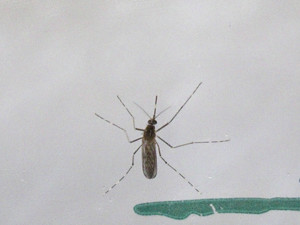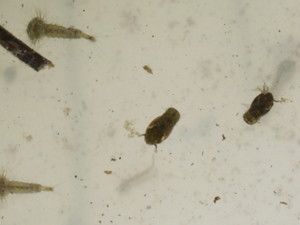 |
April 2015 Newsletter |
Mosquitoes
Mosquitoes can be very irritating and disrupt outdoor activities. They also are able to transmit various diseases to humans and animals. Mosquitoes are known to transmit heartworm in dogs and cats, and they can spread encephalitis (including West Nile Virus), Chikungunya, dengue, yellow fever, malaria and filariasis among humans.
Most female mosquitoes require a blood meal for egg production whereas males feed on nectar and do not bite. Eggs can be laid on the surface of water or in dry locations that are occasionally flooded by water. Some eggs are able to remain dormant under dry conditions for several months. Eggs hatch into larvae, or wigglers. Mosquito larvae live in water and feed on organic debris or microscopic plants and animals. Larvae molt into pupae which do not feed. Mosquito pupae spend the majority of their time at the surface of the water, only moving when disturbed.
Female Mostuito.
Mosquito larvae (left) and pupae (right).
Many things can help to reduce mosquito problems around the home. Eliminate all sources of standing water. Containers such as watering cans, buckets and bottles can turn into mosquito breeding grounds. Water should be drained from birdbaths, gutters, flowerpots and pet dishes at least once a week. Children’s wading pools should be emptied of water at least once a week and stored so they cannot collect water when not in use. Tree holes should be filled in with sand or mortar, or drained after each rain. Leaky faucets and pipes located outside should be repaired.
Areas that cannot be drained, such as ponds or large rain collection systems, can be stocked with mosquito fish that eat mosquito larvae. Dunks can also be used in these areas. Dunks are a small, donut-shaped product that contains Bacillus thuringiensis var. israeliensis. The donut disrupts the life cycle of the mosquito and is non-toxic to humans, amphibians and fish.
Avoiding peak hours when mosquitoes are active is probably the best method to avoid being bitten. When outside, wear loose-fitting, light colored clothing with long sleeves & long pants. Repellants containing active ingredients such as DEET, picaridin or oil of lemon eucalyptus can be effective to keep mosquitoes from biting when evening activities cannot be rescheduled. Other products such as citronella candles will also repel mosquitoes, but work best in enclosed areas.
For more information or help with identification, contact Wizzie Brown, Texas AgriLife Extension Service Program Specialist at 512.854.9600. Check out my blog at www.urban-ipm.blogspot.com


